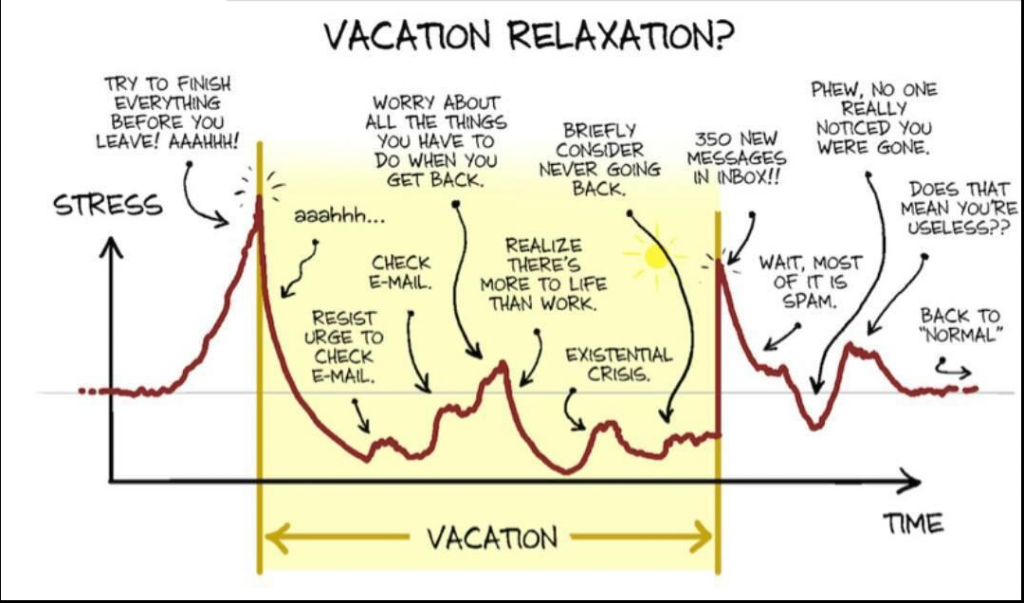 Unlimited vacation time.
Unlimited vacation time.
How does that make you feel when you hear that?
Sounds pretty good, doesn’t it?
All the time off you want/need in a year, but what’s the catch?
Of course, the business has to be in good standing—as a collective, the goals are being exceeded and it’s making money.
And, as an individual, you have to exceed your goals.
But if those two things happen, you can have all the time off that you want.
It’s a perk many start-ups use to lure their team away from competitors.
It’s even one we offer.
But, it turns out, there is an even bigger catch: Unlimited vacation time really means you have to work during your holiday(s).
Humans Are Not Robots
Let me back up for a second.
We do offer unlimited vacation time—and not with the catch that you have to work while you’re out—but it’s nearly impossible to get people to take time off!
Last year, I had to bribe Laura Petrolino to take time off.
This year, I had the exact, same conversation with Corina Manea (and finally convinced her to take this week off).
I’m probably the only boss in the world who tracks how long you’ve been with an organization and whether or not you’ve taken any time off….and then forces it upon you.
I am a big, big believer in having time to relax, recharge, and rest.
You know why?
Because human beings are not robots and we come back, even from just a few days off, more productive, more creative, and more energized.
It’s completely selfish. I want my team to be all of those things. It’s better for me and for my organization.
Humans Burn Out
But if you have to work through your vacation?
All of those benefits disappear.
And not only that, but people burn out.
Even if we adore our jobs and love the work we’re doing, our brains need time to do something else.
This is why we come up with great ideas in the shower or while exercising or sometimes even when we sleep.
Our brains are doing something other than work.
So come back to the “perk” that many start-ups offer in unlimited vacation time.
The catch truly is: You want to go to Europe or Africa or Australia? Great! Make sure you’re still attending meetings, responding to and forwarding email, and doing a minimum day’s worth of work.
That, my friends, is not unlimited vacation time.
It’s a totally cool perk if you want to be a nomad and work from anywhere, anytime and no one cares if you’re remotely even in the same time zone.
But it is not unlimited vacation time.
Humans Are Responsible
Unlimited vacation time means you get time off—truly off—if you need to meet the cable guy, have surgery, or want to leave the country for a few weeks.
It means you can attend your cousin’s wedding and still go on your annual boys’ trip.
The catch in my organization is exactly what I described above: The organization’s goals and the individual goals have to be exceeded.
The current team has to be able to execute on your things while you’re out (we don’t hire freelancers so a person can be out).
But, more than anything, we don’t track against any time off.
When you work with grown-ups—and you treat them that way—and you’ve created a culture of accountability, they are responsible with their time off.
It does not mean someone can take six months of paid maternity or paternity leave.
It does not mean someone can take a paid year-long sabbatical.
It does not mean someone can be gone for weeks or months on end.
What it does mean is one can have reasonable time off within a year’s time.
It means if you have a series of doctor’s appointments or want to go to your kid’s summer picnic, no one is watching the clock to make sure you’re putting in the time.
It means if you want to exercise in the middle of the day, no one cares.
It means if you want to take a nap every day, no one is counting that.
It means you can actually take a vacation—and unplug, recharge, and relax—without expecting to have to do any (and I mean any) work.
Poor Managers Ruin Unlimited Vacation Time
The short-sightedness of asking people to work while they’re on vacation makes me roll my eyes so hard they may actually stick in the back of my head.
Not only is it harder—from an HR perspective—to track everyone’s time off, even if it’s just an hour or two in the middle of the day, it subliminally tells your team you don’t trust them.
Not only does it tell people that you don’t trust them, you’ve now created a sense of non-loyalty.
But, worse, it doesn’t allow them to recharge, which hurts you in the long-run.
If you offer an unlimited vacation time policy, make it truly that: Time off without any strings attached.